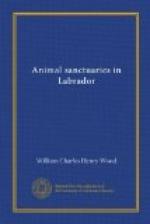and sportsman. But supposing all this does happen.
The mines, water-powers and lumbering will only create
small towns and villages. There will surely be
some conservation to have the forests used and not
abused especially by fire: and the white man
should remember that he is the worst of all in turning
a land from green to black. Except in the southwest
and a few isolated spots, the country cannot be farmed.
At the same time, the urban population must have communications
with the outside world, by which regular supplies
can come in. This will make the settlers independent
of wild life for necessary food; and wild life, in
any case, would be too precarious if exploited in
the usual way. The traders in wild-animal products,
as well as the naturalists, sportsmen and tourists,
are interested in keeping the rest of the country well
stocked. So that, one way and another, the human
and wild-animal life will not conflict, as they do
where farming creates a widespread rural population,
or wanton destruction of forests ruins land and water,
and human and animal life have to suffer for it afterwards.
All the different places required for business spheres
of influence in the near future, added to all the
business spheres of the present, can hardly exceed
the area of one whole England, especially if all suitable
areas are not thrown open simultaneously to lumbering,
at the risk of the usual bad results. So there
will remain ten other Englands, admirably fitted,
in all respects, to grow wild life in the most beneficial
abundance, and quite able to do so indefinitely, if
a reasonable amount of general protection is combined
with well-situated sanctuaries.
The fauna is much more richly varied than people who
think of Labrador as nothing but an arctic barren
are inclined to suppose. The fisheries have been
known for centuries, especially the cod, which has
a prerogative right to the simple word “fish.”
There are herring and lobsters in the Gulf, plenty
of salmon and trout in most of the rivers, winninish
in all the tributary waters of the Hamilton, as well
as in lake St. John, whitefish in the lakes, and so
forth. Then, the stone-carrying chub is one of
the most interesting creatures in the world....
But the fish and fisheries have problems of their own
too great for incidental treatment; and I shall pass
on to the birds and mammals.
Yet I must not forget the “flies”—who
that has felt them once can ever forget them?
Labrador is not a very happy hunting-ground for the
entomologist. But all it lacks in variety of kinds
it more than makes up in number of individuals, especially
in the detestable trio of bot-flies, blackflies and
mosquitoes. The bot-fly infests the caribou and
will probably infest the reindeer. The blackfly
and mosquito attack both man and beast in maddening
millions. The mosquito is not malarious.
But that is the only bad thing he is not. Destruction
is “conservation” so far as “flies,”
parasites and disease germs are concerned.




